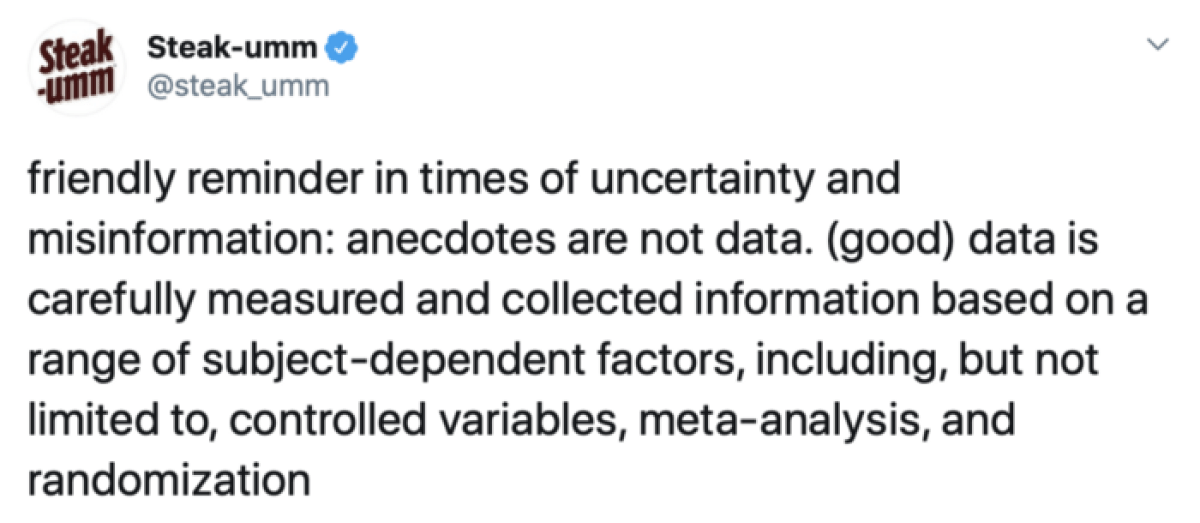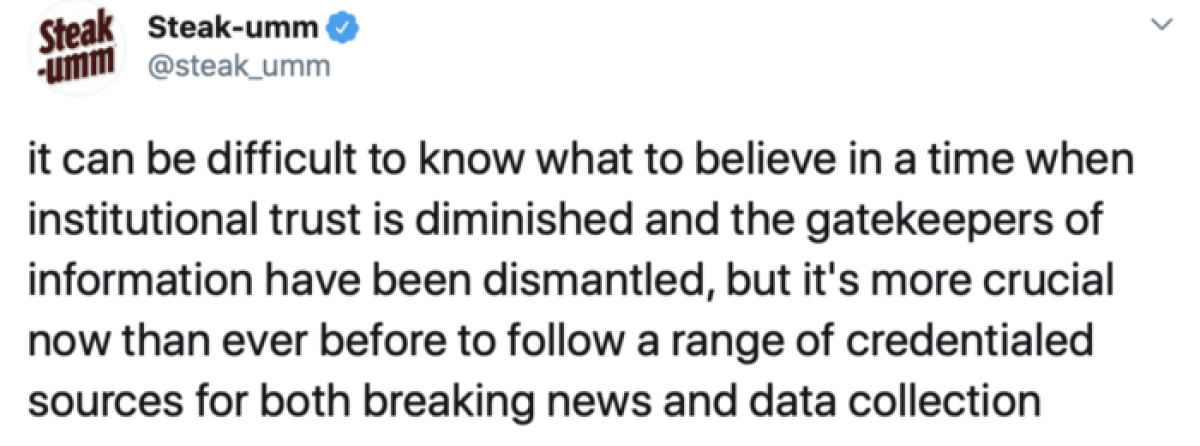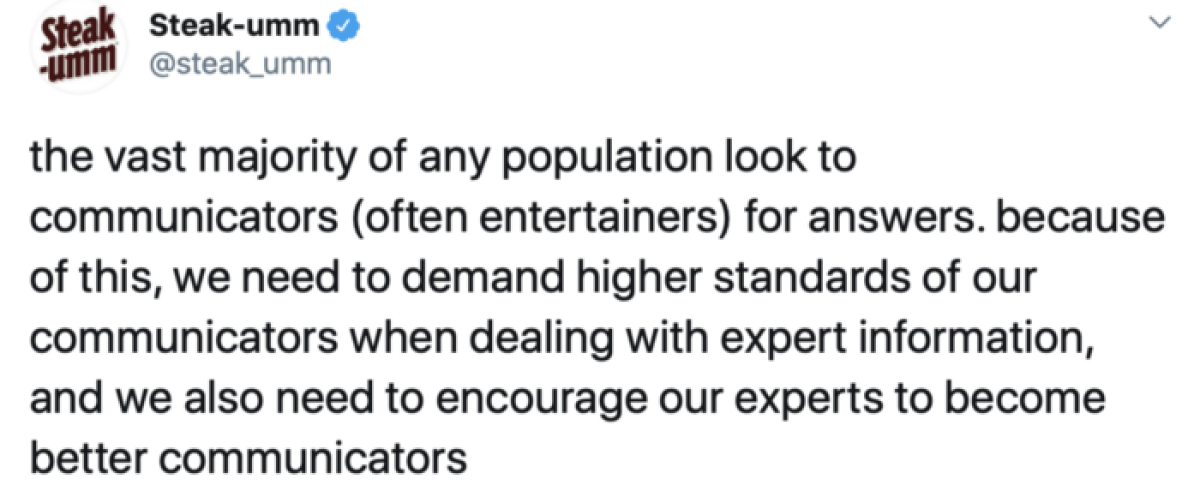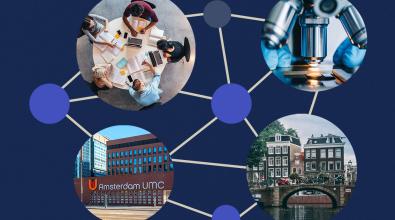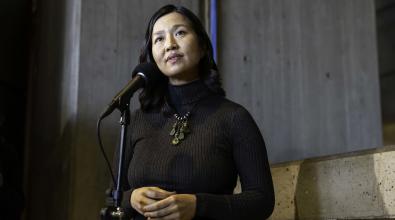What Steak-umm’s Twitter feed can teach city leaders about data
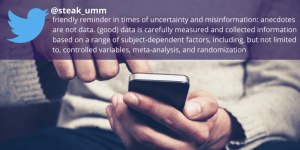
We’ve all had to find our own sources of solace in the midst of the coronavirus pandemic. Baking bread. Doing puzzles. Yelling at family members.
For those working in city governments, I’d suggest one more: a frozen meat company’s Twitter account.
Few would have predicted that some of the most reasonable, level-headed sources of public wisdom during our current crisis would be the tweets of Steak-Umm (@steak_umm), a Pennsylvania-based purveyor of thinly sliced frozen beef. But as one week in quarantine blends into another, a growing number of people are starting to pay attention.
The Steak-umm account’s persona champions data and research to bat down conspiracies as it fights for a reality-based world. As crazy as it sounds, its worldview has strong echoes of one that we at Bloomberg Philanthropies promote through What Works Cities, an initiative that elevates the importance of data-informed decision-making in city halls across the United States. For public servants who haven’t yet had a chance to become Steak-umm account superfans, below are a few lessons from this new and unexpected source of enlightenment.
Lesson 1: When anecdotes are all you have, anecdotes are all you’ll use
It’s hard for city leaders to resist governing by anecdote. There are countless situations in city halls where data to support decision-making are unavailable, incomplete, or compromised. Meanwhile, constituents never stop showing up at meetings, writing letters, or stopping mayors in supermarkets to ask them to fix a problem they’re facing. Those stories are often more emotionally engaging than data. They are made public more quickly than data. And they are from real people whose problems most public servants desperately want to solve. But they are not data.
[Get the City Hall Coronavirus Daily Update. Subscribe here.]
The way to get ahead of this is to put in the work to collect the data you need to tell a larger, more accurate story. Many cities are already doing that to tackle COVID-19. Boston, for example, was one of the first cities to publish detailed data on racial disparities in COVID-19 deaths and hospitalizations. This helps city leaders make decisions about where to target resources and outreach so that testing, facemasks, and outreach campaigns are targeted toward residents who need them most — not just those who have access to power or the ability to tell their story widely.
Lesson 2: Experts are your friends, and they need defending
Through our COVID-19 Local Response Initiative, we’ve heard from mayors that one of the biggest struggles they face in combating the pandemic is the prevalence of conspiracies and rumors that spread like weeds on social media. This should be no surprise. Misinformation grows best in a fearful, uncertain climate.
Cities can fight this by calling out myths directly and clearly communicating the role that scientists and public health experts play in their response efforts. Jackson, Miss., Mayor Chokwe Antar Lumumba modeled this well in a recent press conference where he discussed his reliance on global health experts when making decisions about opening the city.
Dr. Lisa Cooper of the Johns Hopkins Bloomberg School of Public Health urges city leaders to go one step further to make sure their message sticks. In a recent COVID-19 Local Response Initiative City Leaders virtual session, she advised that communities won’t listen to you or your experts if they don’t feel they are being listened to. Likewise, mayors are not always the right messengers to reach people. Dr. Cooper suggests building a kitchen cabinet of trusted community leaders who can communicate the experts’ advice in a way residents will hear it.
Lesson 3: It’s OK (and possible!) to be both data-driven and entertaining
Let’s be honest. Data can be boring. Given a choice between analyzing infection curves or watching the latest YouTube video shouting about some BREAKTHROUGH or SCANDAL, most people go with the latter every time.
That’s why it’s important for city leaders to couch data in humanity — and even entertainment. During the pandemic, Lincoln, Neb., Mayor Leirion Gaylor Baird breaks up the dry updates in her daily COVID-19 press briefings with stories of navigating virtual classrooms with her children and personal wellness advice. Before the current crisis, Sly James — the famously data-driven former mayor of Kansas City, Mo. — once slow-jammed his city’s annual accomplishments, launching a serious subject into conversations on social media that otherwise wouldn’t happen.
It’s perhaps a sad indictment of our society that we are forced to get our dose of reason from a viral frozen steak Twitter account which admits this is all a publicity stunt. (It worked, according to PR Week.) Still, it’s hard to argue when Steak-umm tweets, “in these strange and uncertain times, with information inundation, weaponized fear, and cultural polarization, we have to discover thoughtful, new ways to elevate experts, credible information, and critical thinking that can reach our neighbors in need.”
